We may not have the course you’re looking for. If you enquire or give us a call on +44 1344 203 999 and speak to our training experts, we may still be able to help with your training requirements.
We ensure quality, budget-alignment, and timely delivery by our expert instructors.
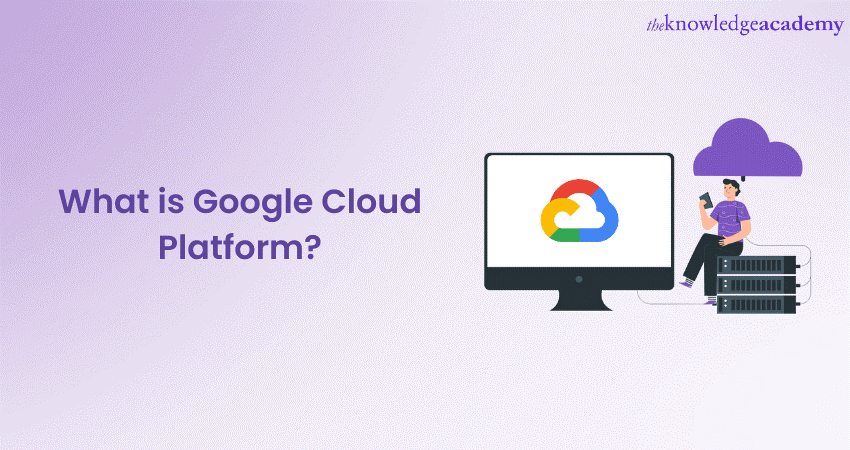
Imagine a place where innovation and reliability come together, allowing businesses to soar without the worry of infrastructure issues. That’s exactly what Google Cloud Platform (GCP) offers—a transformative platform that’s changing the way companies operate in the digital age.
In this blog, we’ll take you on a journey through the story of Google Cloud Platform, from its beginnings to its current role as a leader in Cloud Computing. We’ll explore its key features, benefits, and even some challenges, giving you a clear picture of how GCP can elevate your business.
Ready to harness the power of Google Cloud Platform and take your business to new heights? Let’s dive in, experiment, and discover the endless possibilities together!
Table of Contents
1) Decoding What is Google Cloud Platform?
2) Google Cloud vs Google Cloud Platform
3) Why Use Google Cloud Platform?
4) Google Cloud Platform Components
5) Benefits of the Google Cloud Platform
6) Cons of Google Cloud Platform
7) How can Businesses Leverage Google Cloud?
8) Conclusion
What is Google Cloud Platform (GCP)?
Google Cloud Platform (GCP) is Google’s comprehensive suite of public Cloud Computing tools and services. It includes popular data analytics services like Google BigQuery and Looker Studio.
Key Points about Google Cloud Platform (GCP):
a) Comprehensive Suite: GCP stands for Google Cloud Platform which is Google’s collection of public Cloud Computing products and services.
b) Data Analytics Services: Includes popular services like Google BigQuery and Looker Studio.
c) Infrastructure: Runs on the same infrastructure as Gmail, Google Drive, and Google Docs.
d) Global Network: Supported by Google’s international network of computing facilities.
e) Launch and Expansion: Been in existence since 2008 and has rapidly expanded its offerings.
f) Wide Range of Services: Provides computing services such as network, storage, IoT, protection, application hosting, and scheduling software.
g) Cloud AI: One of the latest additions, emphasising Data Analytics, Machine Learning, and Artificial Intelligence.
Take your data analysis to the next level with the Google BigQuery Analytics PDF. Download now!
History of Google Cloud Platform
Google Cloud Platform (GCP) was launched in April 2008 with the introduction of App Engine, a platform for developing and hosting web applications in Google-managed data centres.
This marked Google’s entry into the Cloud Computing market. Over the years, GCP has expanded significantly, adding a wide range of services including computing, data storage, data analytics, and machine learning.
Some key milestones in GCP’s history include:
a) 2008: Launch of App Engine.
b) 2011: App Engine becomes generally available.
c) 2012: Introduction of Google Compute Engine.
d) 2014: Launch of Google Kubernetes Engine (GKE).
e) 2017: Introduction of Cloud Spanner, a globally distributed database.
f) 2020: Launch of Anthos, a platform for managing applications in hybrid and multi-cloud environments.
Google Cloud vs Google Cloud Platform
Google Cloud:
a) Google Cloud is the overarching brand that encompasses all of Google's Cloud Computing Services.
b) It includes Google Cloud Platform, Google Workspace (formerly G Suite), and enterprise-level APIs.
c) Google Workspace offers productivity tools like Gmail, Google Drive, Docs, Sheets, and more.
Google Cloud Platform:
a) GCP is a subset of Google Cloud focused specifically on Cloud Computing Services.
b) It provides IaaS, PaaS, and serverless computing environments.
c) Services include computing power, data storage, Machine Learning, networking, and big data analysis.
Master the basics with our Google Cloud Platform Fundamentals Course - start your cloud journey today!
Why Use Google Cloud Platform?
Organisations and businesses choose to use Google Cloud Platform for various reasons. Here are some compelling reasons to consider GCP:
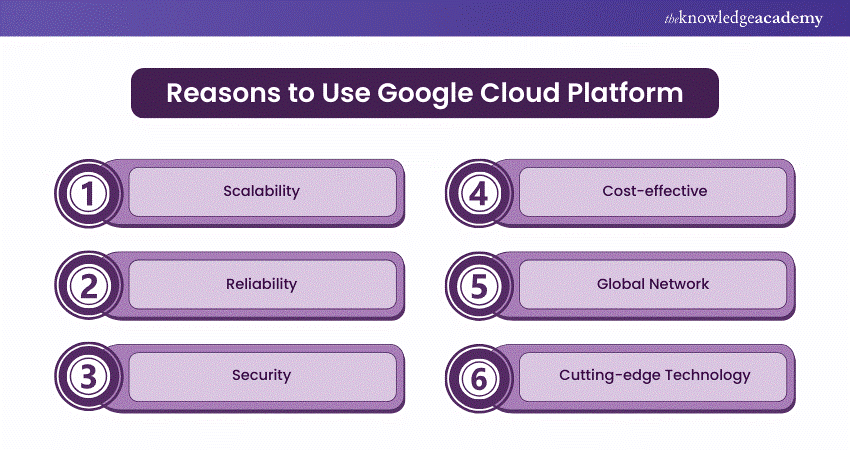
1) Scalability: GCP provides a highly scalable infrastructure that allows you to adjust resources based on your needs. Thus, you can handle increased workloads and traffic without interruptions.
2) Reliability: Google operates some of the world's largest and most reliable data centres. It ensures high availability and minimal downtime for your applications and services.
3) Security: GCP offers robust security measures, including data encryption, identity and access management, and DDoS protection. Google invests heavily in security to safeguard your data and applications.
4) Cost-effective: GCP offers a pay-as-you-go pricing model, allowing you to control costs by only paying for the resources you use. It also offers various pricing options and discounts to optimise your spending.
5) Global Network: Google has a vast and high-performance global network infrastructure that ensures fast and reliable connectivity for users and applications worldwide.
6) Cutting-edge Technology: GCP consistently incorporates the latest technologies, such as Artificial Intelligence, Machine Learning, and Data Analytics, which can be readily integrated into your projects.
Take your app development to the next level with our Developing Applications With Google Cloud Platform Course - sign up now!
Core Services of Google Cloud Platform
Google Cloud Platform offers variouscomponents across various categories to meet different business and development needs. Here are some of the key components:
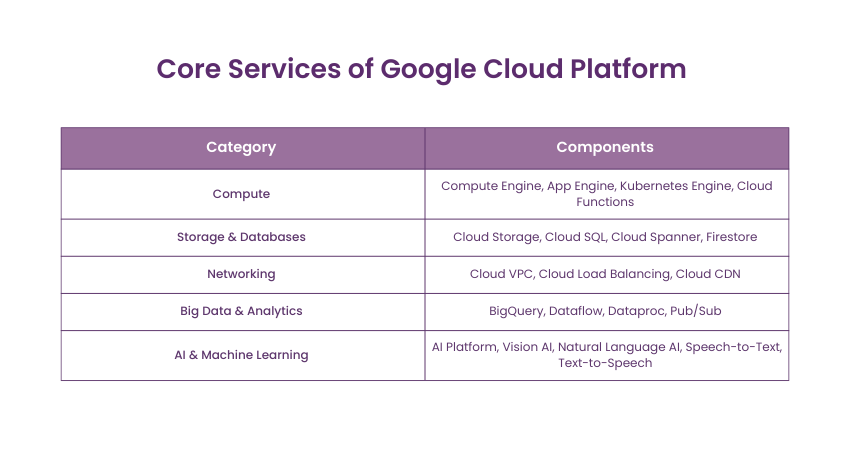
Computing:
a) Compute Engine: Virtual machines running on Google's infrastructure.
b) App Engine: Platform as a service (PaaS) for building scalable web applications.
c) Kubernetes Engine: Managed Kubernetes service for containerised applications.
d) Cloud Functions: Serverless execution environment for building and connecting cloud services.
Prepare for success with our guide on Google Cloud interview questions! Get insights and tips to ace your interview and land your dream cloud role!
Storage & Databases
a) Cloud Storage: Object storage service for storing and retrieving any amount of data.
b) Cloud SQL: Oversaw MySQL relational database services, SQL Server and PostgreSQL.
c) Cloud Spanner: Globally distributed, horizontally scalable database service.
d) Firestore: NoSQL document database for mobile, web, and server development.
Networking
a) Cloud VPC: Virtual private cloud to manage networking resources.
b) Cloud Load Balancing: Scalable load balancing for web applications.
c) Cloud CDN: Content delivery network to serve content globally with low latency.
Explore the benefits of Google Cloud Storage—a reliable, flexible, and secure solution for managing your data effortlessly
Big Data & Analytics
a) BigQuery: Fully managed, serverless data warehouse for large-scale Data Analytics.
b) Dataflow: Stream and batch data processing service.
c) Dataproc: Managed Spark and Hadoop service.
d) Pub/Sub: Messaging service for event-driven systems and streaming analytics.
AI and ML Services
a) AI Platform: Tools for building, deploying, and managing Machine Learning models.
b) Vision AI: Image analysis service.
c) Natural Language AI: Text analysis service.
d) Speech-to-Text and Text-to-Speech: Speech recognition and synthesis services.
Advance your knowledge with Networking With Google Cloud Platform Course- secure your future in cloud networking!
Benefits of the Google Cloud Platform
GCP’s unique features culminate in a wealth of advantages, empowering businesses to work more effectively and intelligently. Let's have a quick look at each of these benefits:
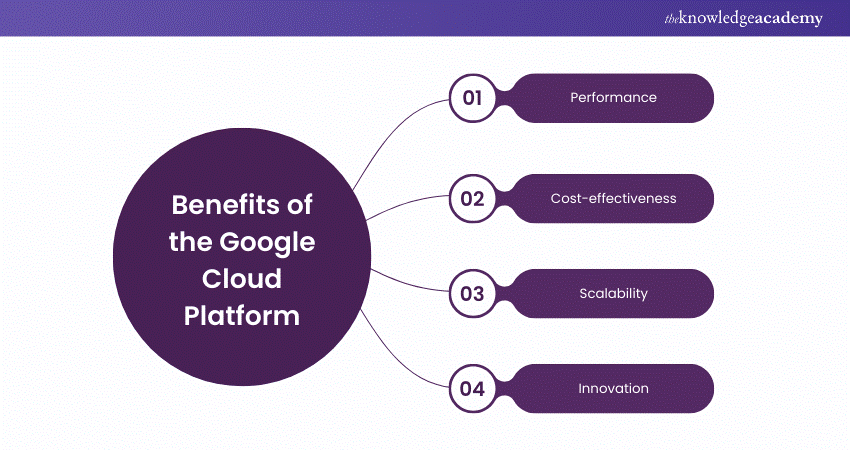
1) Performance
GCP's infrastructure is a hallmark of excellence, offering swift, reliable, and secure performance. This is the same infrastructure that powers Google Search and YouTube, two of the world's most widely used digital services. Thus, GCP's infrastructure is not only robust but also proven under the most demanding conditions. This assures businesses of its reliability and capacity to handle high volumes of traffic and data.
2) Cost-effectiveness
Google's pricing model proves more flexible compared to other Cloud service providers, offering a 'pay-as-you-go' scheme. It means you only pay for the resources you use. Further sweetening of the deal is automatic discounts applied based on resource usage. This allows businesses to optimise their expenditure while enjoying top-tier cloud services.
3) Scalability
Regardless of whether you're a start-up, a small business, or a large enterprise, Google Cloud allows you to adjust your applications in line with your business needs. This means you can scale up during peak times to maintain performance. You can also scale down during quieter periods to conserve resources, all in minutes.
4) Innovation: The platform provides a range of advanced services, including Machine Learning and AI tools. These technologies allow businesses to gain insights from their data, optimise their operations, and create new, intelligent features for their users.
Master Big Data Analysis with our Data Engineering With Google Cloud Platform Course -Join today!
Cons of Google Cloud Platform
Google Cloud Platform provides various Cloud services and solutions. However, it's important to consider its limitations. Some of the cons of Google Cloud Platform include the following:
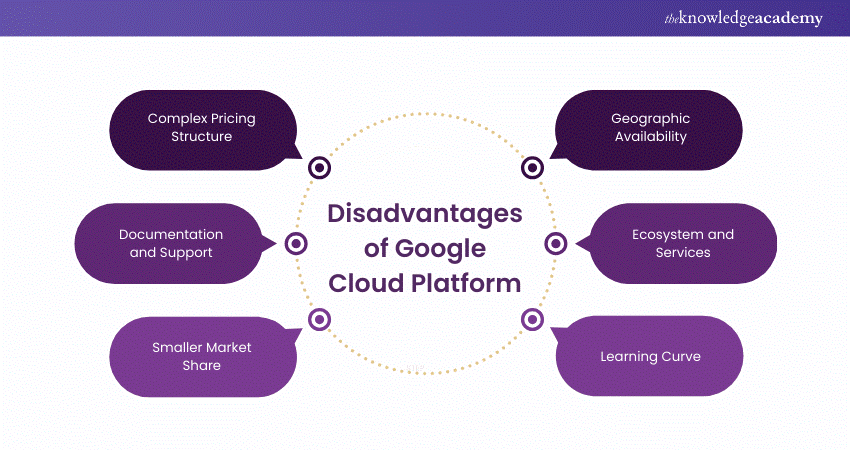
1) Complex Pricing Structure: GCP's pricing can be complex and difficult to estimate accurately. Users may find it challenging to predict their monthly bills, especially for variable or usage-based services.
2) Documentation and Support: While Google provides extensive documentation and a knowledge base, some users may find it less user-friendly compared to other Cloud providers like Amazon Web Services (AWS) or Azure. The level of customer support can vary depending on your subscription tier.
3) Smaller Market Share: GCP has a smaller market share compared to AWS and Azure. Thismeans that there are fewer third-party integrations and community resources available. This can make it harder to find expertise and pre-built solutions for specific use cases.
4) Geographic Availability: GCP may not have data centres available in all regions or countries. This can limit its geographic reach and impact latency for users in certain areas.
5) Ecosystem and Services: While GCP offers numerous services, it may not have as extensive an ecosystem as AWS or Azure. This could be a disadvantage if you require specific integrations or niche services.
6) Learning Curve: GCP services and tools may have a steeper learning curve for users who are not already familiar with Google's products and technologies. Transitioning from other cloud providers may require additional training and effort.
Unlock new opportunities with Python With Google Cloud Platform Training - start your journey with us now!
How Businesses can Leverage Google Cloud?
Across the globe, businesses are progressively adopting Google Cloud Platform (GCP), finding the potent suite of tools it provides to be invaluable in many ways. GCP facilitates the creation of new applications, enhances existing ones, provides insight into Big Data, and empowers businesses with its AI capabilities. Let's see how it helps businesses:
For Start-ups
GCP proves to be an ideal choice for start-ups. With its scalable infrastructure, companies can effortlessly manage their growth, expanding their digital footprint without the associated worry about server management. Furthermore, the Machine Learning capabilities offered by GCP can be a significant game-changer. These capabilities enable start-ups to make informed decisions, predict trends, and offer innovative solutions to their users.
For Enterprises
For larger enterprises, GCP's Hybrid and Multi-cloud Anthos is a major boon. This service allows businesses to run their applications anywhere, from the company's local data centre to Google's cloud platform. Even other third-party cloud providers like Amazon AWS or Microsoft Azure, in a secure and unified manner. This flexibility empowers enterprises with the freedom to operate their applications where it best suits them, without being locked into a single Cloud Provider.
Power your applications with Google App Engine. Achieve auto-scaling, easy deployment, and seamless integration. Start building today!
Big Data Solutions
GCP offers a robust set of big data solutions, with BigQuery being a prime example. Google's fully managed, serverless data warehouse enables businesses to analyse massive data sets with incredible speed and efficiency. This tool provides an opportunity for businesses to make data-driven decisions, enhancing strategies and operations based on solid, quantifiable insights. For a deeper dive into how these solutions work, you can refer to the Google Cloud Platform Fundamentals PDF for more detailed guidance.
AI and ML services
GCP's AI and ML services offer businesses a route into the world of smart applications. With these tools, businesses can gain insights like never before, utilising AI to recognise patterns and make predictions. From automating simple tasks to creating intelligent, adaptive applications, GCP's AI and ML services can transform the way businesses operate, driving efficiency and innovation.
Join our Google Cloud Certification and unleash the full potential of Cloud Computing for your business!
Conclusion
Unlock the potential of Google Cloud Platform to transform your business. With its robust infrastructure, advanced Data Analytics, and powerful Machine Learning solutions, GCP accelerates innovation and growth. Ready to elevate your operations and stay ahead of the competition? Embrace the future with GCP today!
Elevate your expertise with Google Cloud Training - stay ahead in the digital world!
Frequently Asked Questions
What is a GCP role?

A role has permissions that let you do specific things with Google Cloud. You assign roles to users, groups, and service accounts to give them permissions.
Is GCP free or paid?

Google Cloud Platform (GCP) has a free tier that lets you use many GCP services and resources without cost. This includes stuff like Google Compute Engine, Google Cloud Storage, and Google Cloud Functions, as well as other incredible tools and services.
What are the Other Resources and Offers Provided by The Knowledge Academy?

The Knowledge Academy takes global learning to new heights, offering over 3,000 online courses across 490+ locations in 190+ countries. This expansive reach ensures accessibility and convenience for learners worldwide.
Alongside our diverse Online Course Catalogue, encompassing 19 major categories, we go the extra mile by providing a plethora of free educational Online Resources like News updates, Blogs, videos, webinars, and interview questions. Tailoring learning experiences further, professionals can maximise value with customisable Course Bundles of TKA.
What is The Knowledge Pass, and How Does it Work?

The Knowledge Academy’s Knowledge Pass, a prepaid voucher, adds another layer of flexibility, allowing course bookings over a 12-month period. Join us on a journey where education knows no bounds.
What are the Related Courses and Blogs Provided by The Knowledge Academy?

The Knowledge Academy offers various Google Cloud Certification, including Google Cloud Platform Fundamentals, Data Engineering with Google Cloud Platform and Developing Applications with Google Cloud Platform. These courses cater to different skill levels, providing comprehensive insights into Google Cloud Functions.
Our Cloud Computing Blogs cover a range of topics related to Google Cloud Platform, offering valuable resources, best practices, and industry insights. Whether you are a beginner or looking to advance your Cloud Computing skills, The Knowledge Academy's diverse courses and informative blogs have got you covered.
Upcoming Cloud Computing Resources Batches & Dates
Date
 Google Cloud Platform Fundamentals
Google Cloud Platform Fundamentals
Fri 28th Mar 2025
Fri 23rd May 2025
Fri 4th Jul 2025
Fri 5th Sep 2025
Fri 5th Dec 2025






 Top Rated Course
Top Rated Course



 If you wish to make any changes to your course, please
If you wish to make any changes to your course, please


